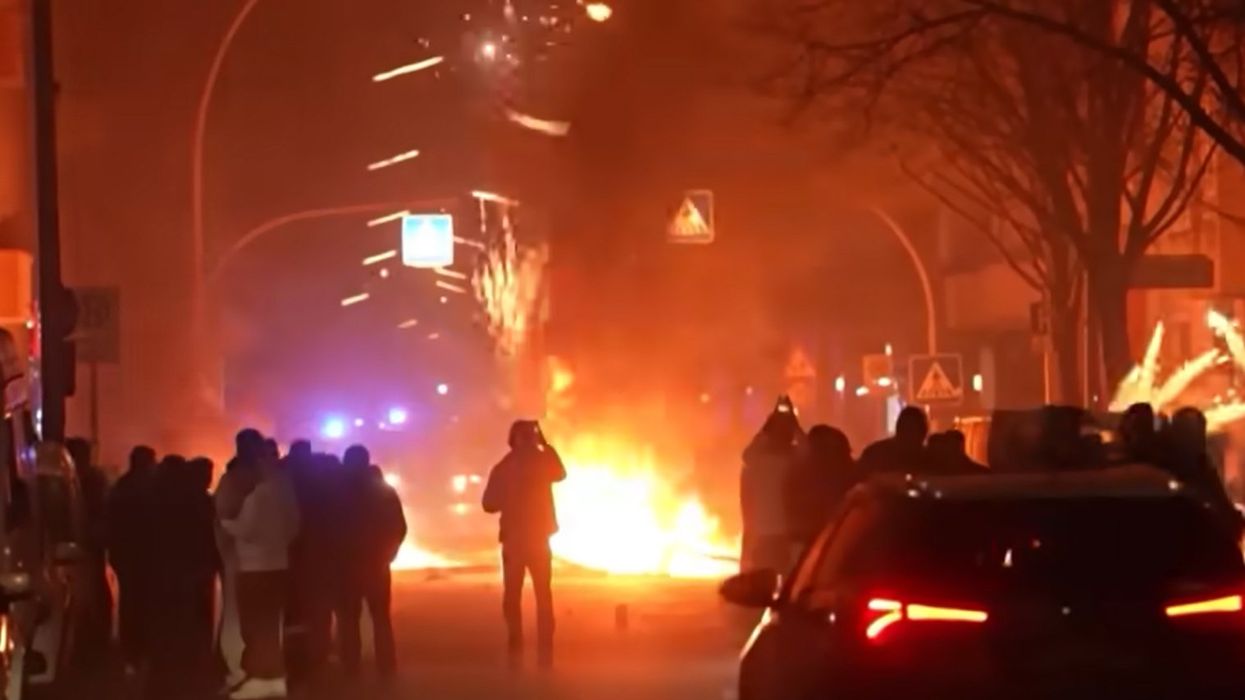
YouTube video, DW News - Screenshot

Germany is preparing for another New Year's Eve spoiled by rioting migrants largely from the Middle East. This time around, officials are taking extra precautions as they anticipate even worse violence on account of the Israel-Hamas conflict.
These preparations — which come just one week after German police flushed out Hamas terrorists believed to have been plotting an attack on European soil — bookend a year that began with a debate over immigration policy and the failure of cultural integration. Judging from government officials' sustained concerns, it appears that debate did not prove fruitful.
Last New Year's Eve, riots broke out in several German cities, including Berlin, Hamburg, and Frankfurt. Rioters targeted first responders and passersby with firecrackers, rockets, and starting pistols, according to Warsaw's Centre for Eastern Studies.
Some rescue workers were lured into ambushes and attacked nearby vehicles that had been set aflame. Others were robbed.
The German paper Bild reported that the police and fire brigade responded over 3,900 times on that fateful night, facing especially bad attacks in the "hotspot districts of Kreuzberg and Neukölln with a high proportion of migrants."
Reuters reported that two-thirds of the rioters detained by police were non-citizens, including 27 Afghans and 21 Syrians. The others were largely residents from migrant communities. The majority were under the age of 21.
"It's more about unregulated migration, failed integration and a lack of respect for the state rather than fireworks," Jens Spahn, a German politician who served as federal minister of health until 2021, told the Berliner Zeitung. "The attacks on emergency services are unspeakable."
The right-wing Alternative for Germany party issued a statement on Jan. 2, noting, "Anarchy reigned in Berlin on New Year’s Eve. It was a first foretaste of future everyday life in German cities because although the authorities and the press are adamantly silent when it comes to the specific naming of the perpetrators, the countless videos of that night speak volumes."
The AfD added, "There is only one effective remedy against such scenes: finally protect the borders and deport criminal migrants immediately."
German Interior Minister Nancy Faeser stated, "Good politics must clearly state what is happening: In major German cities we have a problem with certain young men with a migrant background who despise our state, commit acts of violence and are hardly reached by education and integration programs."
Kai Wegner, a German politician with the Christian Democratic Union and governing mayor of Berlin, told Bild, "This must finally come to an end. The state can no longer stand by and watch as chaotic people repeatedly attack police officers and firefighters. These are not trivial offenses, they are crimes. These incidents must be consistently pursued and punished."
Rather than address the underlying problems, authorities instead mulled over addressing one of the bombastic symptoms. German police and firefighters' unions reportedly called for a ban on personal fireworks as well as increased surveillance.
Conservatives countered, suggesting a fireworks ban wasn't necessary if German officials would only enforce the criminal laws already on the books.
Christine Aschenberg-Dugnus, a politician with the Free Democratic Party, said, "[O]nly consistent prosecution of the perpetrators under criminal law can prevent such attacks," reported DW.
Faeser expressed fear Thursday that the usual suspects will pick up where they left off last January, attacking police and firefighters, torching vehicles, and wreaking havoc in Berlin and other major cities, reported DW.
"I'm worried that New Year's Eve could once again be a day on which we are forced to experience blind rage and senseless violence in some cities, for example, against police officers or emergency services," said Faeser.
The interior minister indicated that federal states will roll out additional police this year on the basis of new risk assessments.
"On days like New Year's Eve, we now see a general increase in violence," Faeser continued, "and, of course, we have to keep a very close eye on the danger of this mixing with radicalization, which we are now seeing in light of the Middle East conflict."
Some Germans fear that there will be other targets this year beside first responders, especially amidst the recent rise in anti-Jewish violence.
German actress Monika Gruber told Bild in a recent interview, "I'm really a bit afraid of New Year's Eve this year, especially given the anti-Semitic protests like the ones recently in Essen. I'm horrified by the images that might come."
DW indicated that as of early November, anti-Semitic incidents had increased by 300% in Germany since the Oct. 7 Hamas terror attacks against Israel.
Why Germany debates immigration, integration and racism after New Year's Eve escalations | DW Newsyoutu.be
Like Blaze News? Bypass the censors, sign up for our newsletters, and get stories like this direct to your inbox. Sign up here!